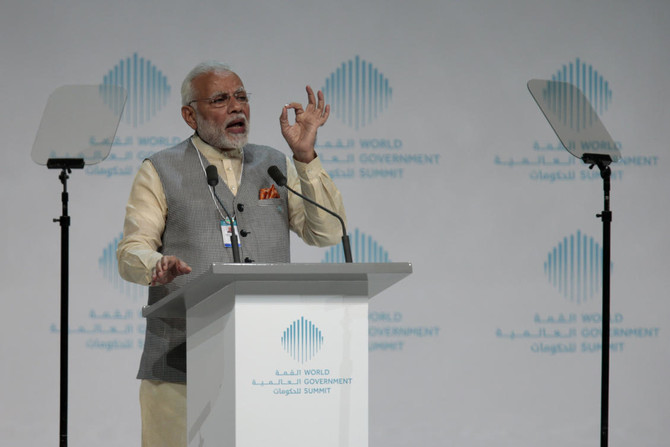DUBAI: Thousands of Indians gathered in the sunny morning at Dubai Opera, where Prime Minister Narendra Modi witnessed the Shila Pujan (Hindu religious prayer) of the stone temple to be built in Abu Dhabi and addressed the gathered members of the community.
The event was organized as a theatrical production. Famous Indian Tabla (Indian drum instrument) player Bickram Ghosh along with his team entertained the audience with live music. And then 12-year-old Sucheta, a student at an Indian high school in Dubai, sang a medley in 7 different languages including Arabic.
Dubai Opera is a 2,000-seat, multi-format performing arts center, which is located within the Opera District in downtown Dubai. The signature venue for arts and culture events in the city, was packed with colorfully dressed enthusiastic Indians. This was the first time any Indian head of the state used the venue to speak to its countrymen. There were many who were emotionally charged and chanted “Modi, Modi” and “Jai Hind” (long live India).
Three short documentaries were shown about how India’s soft power is expanding across the world, such as Bollywood, Yoga, and Indian cuisine.
When Modi, came at the stage, the audience gave him a standing ovation as a warm welcome.
Before the Modi’s much-awaited speech, a live broadcast was shown from the site of Hindu temple in Abu Dhabi, where special inaugural prayers were happening. Modi, inaugurated the construction site here at Opera House by unveiling the temple monument, covered by palm leaves.
“Palm leaves reflect the peace and harmony of the UAE that gives shade to all people of the world,” said the event host from back stage.
India’s Ambassador to the UAE, Navdeep Singh Suri, while welcoming his prime minister, highlighted the growing India-UAE ties. “When the Indian community see Burj Khalifa lit up with the Indian flag, it gives a lot of energy and enthusiasm to them. And today it’s more than just the address to the Indian community as it is the culmination of a long-held desire for a temple which is coming to fruition,” he said.
In about 20 minutes of his speech, Modi talked about the growing UAE-India relationship. He spoke in Hindi. “It is no more a buyer-seller relationship, but that of partnership,” Modi said, thanking the GCC countries for giving home-like conditions to over 3 million Indians across the region.
“This is an excellent example of human relations between Indians and the Gulf countries,” Modi said. While talking about temple in Abu Dhabi, he thanked Sheikh Mohammed Bin Zayed on behalf of all 125 crore Indians.
“A temple is a catalytic agent of spiritual life. It will help build a new image of India.” He further said that it is our [Indians] responsibility to honor the trust shown by the UAE leadership,” he said.
“India is changing rapidly, and you can experience it here,” he said.
“The UAE is a second home for Indians. One can find Indians here from almost all parts of the country.”
Modi said that India is changing. “There was a time, when people in India were pessimistic and wanted to leave the country for a better future. But just in four years, things have changed in the Indian. Uncertainty has replaced confidence and faith.”
“Changes may bring problems. But they are temporary. India is moving in the right direction. India is changing,” he said.
After speaking to the community, Modi headed toward a government summit where he spoke about technology and governance.
Modi will leave for Oman this evening and will address another gathering of Indian community in Muscat.
India is changing, Modi tells Indian expats in UAE
India is changing, Modi tells Indian expats in UAE

Yemen anti-terror forces display confiscated STC explosives and equipment used

RIYADH: Yemeni anti-terrorism forces, trained and equipped by Saudi Arabia, show confiscated explosives and equipment belonging to the now dissolved UAE-backed Southern Transitional Council (STC) in Mukalla.
Earlier today, Salam Al-Khanbashi, the governor of Hadhramaut, suggested the United Arab Emirates played an alarming role in Yemen and the largest of its 21 governorates.
In a televised press conference yesterday, Al-Khanbashi accused the UAE of having exploited the coalition working to restore legitimate government in Yemen “to achieve its own agenda.”
He also claimed that the citizens of Hadhramaut had been killed, terrorised and tortured by armed groups affiliated with STC leader Maj. Gen. Aidarous Al-Zubaidi, who is backed by the UAE and earlier this month was sacked as vice-president of the country’s Presidential Leadership Council (PLC).











